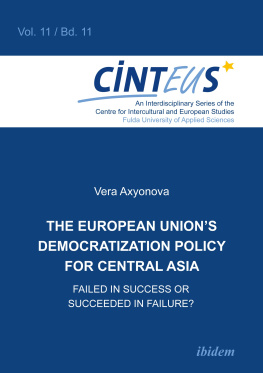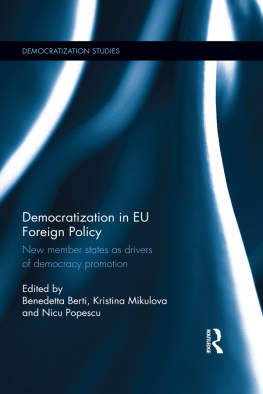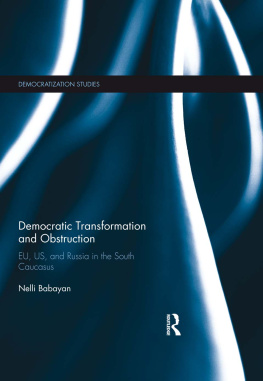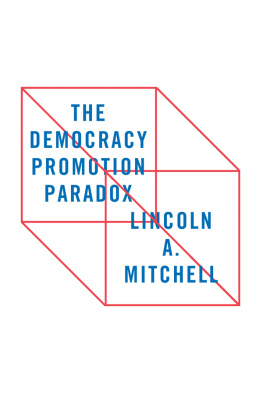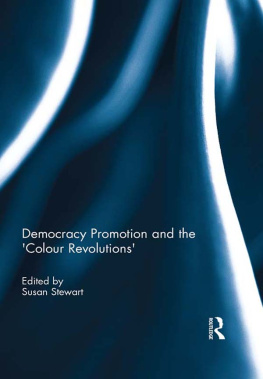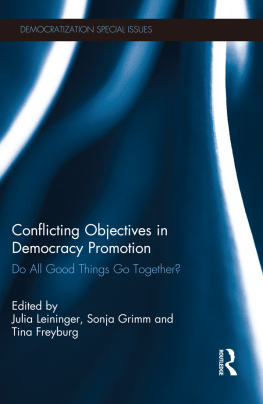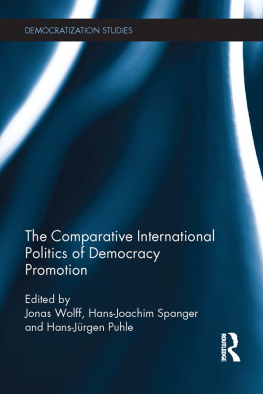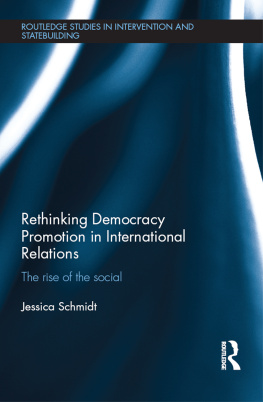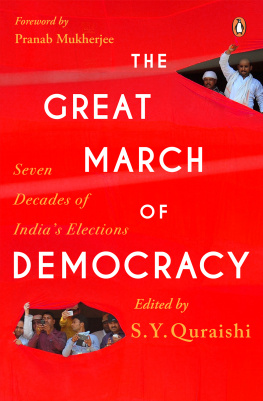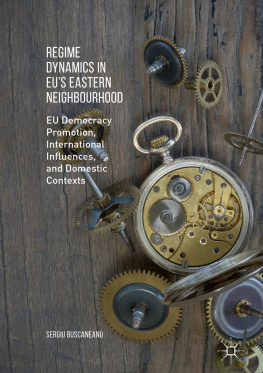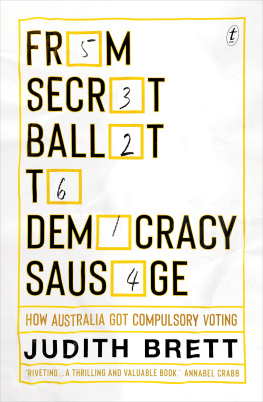Monitoring Democracy
Monitoring Democracy
WHEN INTERNATIONAL ELECTION
OBSERVATION WORKS, AND WHY IT
OFTEN FAILS
Judith G. Kelley

Copyright 2012 by Princeton University Press
Published by Princeton University Press, 41 William Street, Princeton, New Jersey 08540
In the United Kingdom: Princeton University Press, 6 Oxford Street, Woodstock, Oxfordshire OX20 1TW
press.princeton.edu
Cover photo: Haiti Elections, 2010. Taken by Ramon Espinosa, courtesy of AP Images.
All Rights Reserved
Library of Congress Cataloging-in-Publication Data
Kelley, Judith Green.
Monitoring democracy : when international election observation works, and why it often fails / Judith G. Kelley.
p. cm.
Includes bibliographical references and index.
ISBN 978-0-691-15277-6 (cloth : alk. paper)ISBN 978-0-691-15278-3 (pbk. : alk. paper)
1. Election monitoring. 2. Election monitoringCase studies. I. Title.
JF1001.K45 2012
324.6'5dc23 2011026317
British Library Cataloging-in-Publication Data is available
Publication of this book has been aided by
This book has been composed in Minion Pro
Printed on acid-free paper.
Printed in the United States of America
10 9 8 7 6 5 4 3 2 1
This work is based on work supported by the National Science Foundation under Grant No. 0550111. Any opinions, findings, and conclusions or recommendations expressed in this material are those of the author and do not necessarily reflect the views of the National Science Foundation.
To Liv Maria Kelley
Quis custodiet ipsos custodes?
[Who will guard the guardians?]
Juvenal, 1st/2nd century, Satire IV, 346348
Contents
Illustrations
Tables
Preface
IN THE ARAB SPRING OF 2011, turmoil swept the Middle East and North Africa. After Tunisians toppled their dictator of thirty-four years, Ben Ali, historic protests spread to Algeria, Jordan, Yemen, the Palestinian Territories, Libya, and Syria. Protests in Egypt forced President Hosni Mubarak, in power for thirty years, from office. Elections did not spark these protests, but they will play a major role in the coming years as these countries attempt to transition to democracy. Most likely the international community will also play a strong role by sending monitors to these elections.
Elections are just one component of democracy, but a most essential one. As David Brooks wrote in his June 19 New York Times column in the wake of the June 2009 contested Iranian elections, Recently, many people thought it was clever to say that elections on their own dont make democracies. But election campaigns stoke the mind and fraudulent elections outrage the soul. The Iranian elections have stirred a whirlwind that will lead, someday, to the regimes collapse. Hastening that day is now the central goal.
Whether elections spur protest or facilitate transitions, they are important. Without elections, there can be no democracy. Even after transitions, as countries settle into a democratic rhythm, elections remain a central accountability mechanism and the primary tool for citizens to express their preferences and choose their government.
Unfortunately, I do not have the right to vote. As a Dane living in the United States, I fail to fulfill the Danish residency requirement to vote in Denmark and the American citizenship requirement to vote in the United States. I am thus entirely disenfranchised. Perhaps this explains my fascination with elections. To me they represent that most fundamental exercise of a citizen: the right to express ones preference, to be counted, to be part of the conversation, to be considered worthy of persuading.
My interest in election monitoring was born in September 2004, when I went to Brussels to research a project on the European Neighborhood Policy. A scheduled interviewee was unavailable and instead I met with Michael Mayer-Resende, who worked with election monitoring and assistance in the Directorate-General for External Relations in the European Commission. This interview revealed several ambiguities and prompted a whole array of questions about the politics, efficacy, and norms of international election monitoring. How had international election monitoring evolved given that elections were traditionally such a stronghold of national sovereignty? Why were both intergovernmental and nongovernmental organizations involved, and why did there seem to be so little supranational structure to the ventures? Why did some countries invite monitors, yet clearly intend to cheat? And why did some organizations still bother to go to these countries? Did monitors influence the domestic politics? Most important, did they really improve the quality of elections? Why was there so much criticism of monitors by some commentators? Did monitors ever make mistakes, and if so, were these true errors or strategic maneuvers? Who were these monitors really, and what were they trying to accomplish?
I soon began to read all the scholarly work on election monitoring and found it contradictory and interesting. The literature was rich, but populated primarily by case studies. Systematic overviews were nearly absent, and there was little quantitative analysis. Most of the authors were practitioners, area specialists, or scholars focusing on the domestic situation and commenting only tangentially or casually on the practices and habits of international election observers. Furthermore, no analysis really used theories of international relations to examine the interaction between the international and the domestic levels.
This intrigued me, because I have always been interested in this interaction and in the influences of the international community on domestic politics and government behavior. I began to search for election monitoring reports and found that they were valuable primary documents with abundant descriptions, sometimes of book length. To my surprise, however, for some reason they had remained entirely unused by scholars. For example, given the many shelves that could be filled entirely with scholarship on the post-communist transitions, I was surprised to learn from staff at the Organization of Security and Co-operation in Europe that I was the first to request copies of their early 199095 election monitoring reports from these countries. The discovery of this fountain of information contained in the formal election monitoring reports led me to write a grant to the National Science Foundation to begin the Project on International Election Monitoring.
My debt to others for help on this project is enormous. Numerous Duke students have put in many hundreds of hours on this project. I thank Ashley Wallace, Anya Wingert, Dan Kselman, Elizabeth Bruns, Elizabeth Freeman, Emily Hanawalt, Erika Seeler, Hannah Kaye, Kian Ming Ong, Lenka Bustikova, Maria Cristina Capelo, Marin Magat, Nanette Antwi-Donkor, Rachel Bahman, Ren Yuan, Valentino Nikolova, Sophie Lehman, and Spencer Gilbert for their invaluable research assistance. I am especially grateful to Kiril Kolev, who worked for three years on the project and has been an invaluable assistant and friend, and to Mark Buntaine, who was an invaluable statistical expert and always a pleasure to work with.
I presented versions of this work at annual meetings of the International Studies Association and the American Political Science Association, and at a conference at Northwestern University, as well as at the University of Minnesota International Relations colloquium, the University of Chicago PIPES seminar, the Princeton International Relations colloquium, the Duke University Public Policy Fac-Doc Colloquium, and the CUIPS seminar at Columbia University, at seminars at both Lund University and the University of Stockholm, Sweden, and twice at the international politics seminar at Aarhus University, Denmark. I am grateful to all the participants who took the time to read the papers and offer their insights.
Next page

